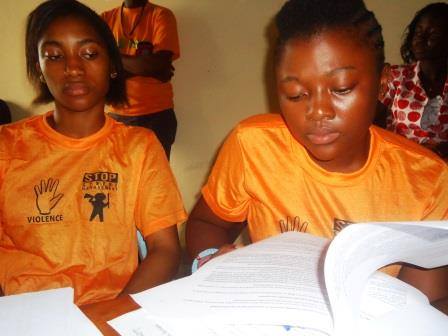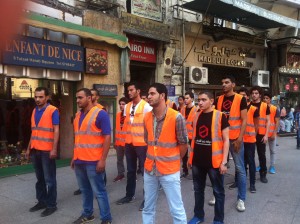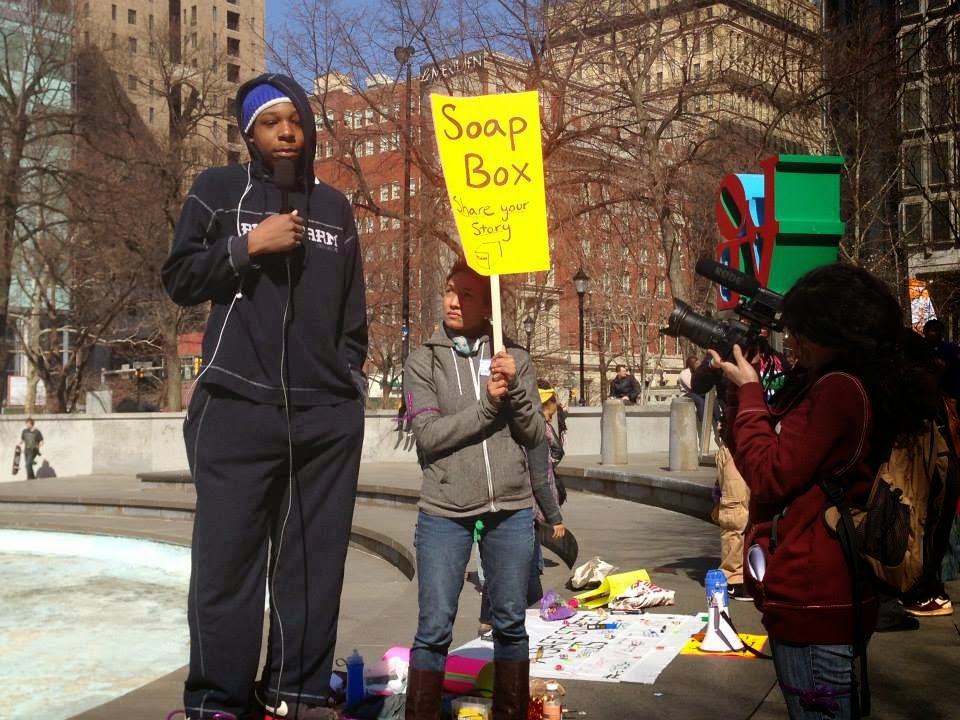Nov. 25 – Dec. 10 are the 16 Days of Activism Against Gender-Based Violence. To commemorate the week, we are featuring 1 activism idea per day. This information is excerpted from my new book Stop Global Street Harassment: Growing Activism Around the World (Praeger 2015).
Street harassment begins at a young age for many people. More adults are recognizing this and the importance of creating spaces, like workshops, for youth to talk about their experiences and brainstorm strategies of resistance. Youth workshops have taken place in countries like the United States, Cameroon, and Germany.
In March 2012 in the United States, female youth organizers at the Brooklyn, New York-based nonprofit Girls for Gender Equity (GGE) hosted “Bring Your Brother Day” to talk about street harassment. The young women of GGE “felt strongly about the importance of bringing the young men in their lives into their work to counteract sexual harassment and gender-based violence,” wrote community organizer Neferiti Martin and intern Katie Bowers for the SSH blog. “The workshop grew out of youth organizers’ concerns that the conversation around street harassment and gender-based violence is taking place primarily among women. By reaching out to the young men in their lives, youth organizers are working to build allies.”
The three-hour workshop explored gender stereotypes and how they impacted the lives of young people and included street harassment story sharing and a discussion about how young men can be allies to young women. “The young men were thoughtful, open, and engaged throughout the workshop,” wrote Martin and Bowers. “Their comments and opinions added new depth to the conversation and reflected the positive influence of the awesome young women in their lives.”
 Wearing orange shirts that said “Stop Street Harassment,” 25 youth aged 15–19 attended a street harassment seminar in Buea, Cameroon, in December 2013 that was organized by Zoneziwoh M. Wondieh, the leader of Young Women for a Change, Cameroon (WFAC). In small groups, the youth shared their stories of harassment, ranging from whistling to grabbing and touching. “African baby,” “Fine ass,” “My size,” and “Pretty butts” were examples of verbal harassment the girls said they had faced. One boy shared how he had been sexually harassed by a man and how it made him understand better what his female peers experienced on a regular basis.
Wearing orange shirts that said “Stop Street Harassment,” 25 youth aged 15–19 attended a street harassment seminar in Buea, Cameroon, in December 2013 that was organized by Zoneziwoh M. Wondieh, the leader of Young Women for a Change, Cameroon (WFAC). In small groups, the youth shared their stories of harassment, ranging from whistling to grabbing and touching. “African baby,” “Fine ass,” “My size,” and “Pretty butts” were examples of verbal harassment the girls said they had faced. One boy shared how he had been sexually harassed by a man and how it made him understand better what his female peers experienced on a regular basis.
For six hours the youth listened to guest speakers, learned steps for dealing with harassers, and engaged in role-play and debates with the goal of being ready to mentor others and speak out against harassment in their community. As an outcome of the youth seminar, WFAC launched an SMS text campaign to send educational text messages about street harassment to anyone who wants to receive them on a weekly or bi-weekly basis. Wondieh posts tips and information over social media, too. She estimates that she has reached 1,000 youth through her various efforts, and she’s having an impact. For example, a young man recently told her that thanks to the information she shares, he has “reconsidered what he thinks is proper behavior toward women.”
In Germany, the women in the group ProChange recognize that the best place to start educating people about street harassment, sexual violence, and sexism is in schools, so in 2014, they created violence prevention and assertiveness workshop trainings for students ages 9–12 years old. So far, they have held one workshop and are working to secure more funding to be able to lead more. “We want to achieve a shift in their mindset so that the youth can be self-confident and free from role models and stereotypes,” they told me. “In our view it is important to start at an early age because they are already surrounded by stereotypes and influenced by sexist advertisements and media … [We want them] to be empowered to choose their own ways.”
Help fund our work in 2016, donate to our end-of-year giving campaign!




